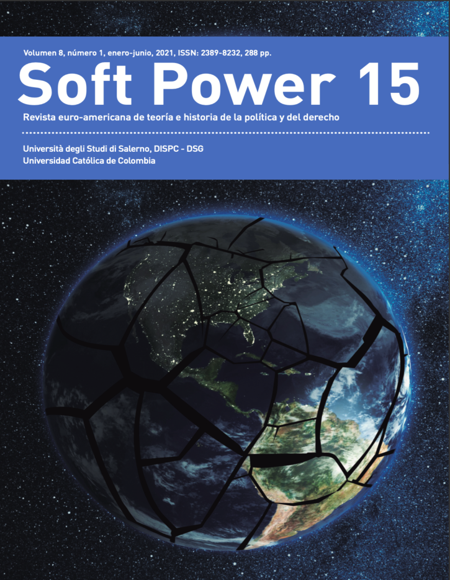
Este trabalho está licenciado sob uma licença Creative Commons Attribution-NonCommercial 4.0 International License.
Al enviar los artículos para su evaluación, los autores aceptan que transfieren los derechos de publicación a Soft Power. Revista Soft Power para su publicación en cualquier medio. Con el fin de aumentar su visibilidad, los documentos se envían a bases de datos y sistemas de indización, así mismo pueden ser consultados en la página web de la Revista.Resumo
Not so many years ago, Flew argued that, in a relatively short period of time, the term “neoliberalism” had become “a kind of conceptual trash-can, into which anything and everything can be dumped, as long as it is done so with suitable moral vehemence” (Flew, 2014, p. 67). Although scholars cautioned early on against “reify[ing] neoliberalism and treat[ing] it as a phenomenon which manifests itself everywhere and in everything” (Gamble, 2001, p. 134), Flew asserts that “this is in fact what has happened to neoliberalism over the last decade” (Flew, 2014, p. 51). She offers an astounding number of —sometimes amusing— examples that illustrate how the term has been used in this very way, in contexts ranging from the space dedicated to books in Australian public libraries to the popularity of Bollywood-style weddings (p. 51).

Referências
Arrighi, G. (1994). The Long Twentieth Century: Money, Power and the Origins of Our
Time. London-New York: Verso.
Arrighi, G. (1997). Financial Expansions in World Historical Perspective: A Reply to
Robert Pollin. New Left Review, 224, 154–159.
Arrighi, G. (2000). Globalization and historical macrosociology. In J. Abu-Lughod
(Ed.), Sociology for the Twenty-First Century. Continuities and Cutting Edges (pp.
–133). Chicago: Chicago University Press.
Arrighi, G. (2007). Adam Smith in Beijing: Lineages of the Twenty-First Century. London:
Verso.
Bobbio, N. (1970). Dell’uso delle grandi dicotomie nella teoria del diritto. Rivista internazionale
di filosofia del diritto, XLVII, 187–204.
Brabazon, H. (2017). Introduction. Understanding neoliberal legality. In H. Brabazon
(Ed.), Neoliberal Legality. Understanding the role of law in the neoliberal project (pp.
–21). New York : Routledge.
Braudel, F. (1958). Histoire et Sciences sociales: La longue durée. Annales. Économies,
Sociétés, Civilisations, 13(4), 725–753.
Braudel, F. (1979). Afterthoughts on Material Civilization and Capitalism. Baltimore and
London: The Johns Hopkins University Press.
Braudel, F. (1984). Civilization and Capitalism, 15th–18th Century, vol. III. The Perspective
of the World. New York: Harper & Row.
Dicey, A.V. (1885). Introduction to the study of the law of the constitution. London: Macmillan.
Flew, T. (2014). Six Theories of Neoliberalism. Thesis Eleven, 122(1), 49–71.
Frank, J. (1930). Law and the Modern Mind. New York: Brentano.
Gamble, A. (2001). Neo-Liberalism. Capital & Class, 25(3), 127–134.
Giolo, O. (2020). Il diritto neoliberale. Napoli: Jovene.
Hardt, M. & Negri, A. (2000). Empire. Cambridge: Harvard University Press.
Harvey, D. (2005). A Brief History of Neoliberalism. New York: Oxford University Press.
Ingham, G. (2008). Capitalism. Cambridge: Polity Press.
Kennedy, D. (1982). The Stages of the Decline of the Public/Private Distinction. University
of Pennsylvania Law Review, 130(6), 1349–1357.
Keynes, J.M. (1936). The General Theory of Employment, Interest and Money. London:
Macmillan.
Lucy, W. & Williams, A. (2013). Public and private: neither deep nor meaningful? In K.
Barker & D. Jensen (Eds.), Private law. Key encounters with public law (pp. 45–88).
Cambridge: Cambridge University Press.
Marx, K. (1958). On the Jewish question. Cincinnati, Ohio: Hebrew Union College-Jewish
Institute of Religion [Ed. or. 1844].
Palacios, A. (2017). Neoliberal law and regulation. In H. Brabazon (Ed.), Neoliberal Legality.
Understanding the role of law in the neoliberal project (pp. 61–76). New York:
Routledge.
Perrone, N.M. (2017). Neoliberalism and economic sovereignty. Property, contracts,
and foreign investment relations. In H. Brabazon (Ed.), Neoliberal Legality. Understanding
the role of law in the neoliberal project (pp. 43–60). New York: Routledge.
Pirenne, H. (1914). The Stages in the Social History of Capitalism. The American Historical
Review, 19(3), 494–515.
Polanyi, K. (1944). The Great Transformation. New York: Holt, Rinehart & Winston.
Pupolizio, I. (2015). Il diritto ad un mondo immutabile. L’esproprio indiretto negli accordi
sulla protezione degli investimenti e il concetto di «pubblico» nel diritto. Stato
e mercato, 104(2), 309–40.
Pupolizio, I. (2019). Pubblico e privato. Teoria e storia di una grande dicotomia. Torino:
Giappichelli.
Savage, M. (2009). Against Epochalism: Numbers, Narrative and Socio-cultural Change.
Cultural Sociology, 3(1), 217–38.
Sonti, S. (2018). The World Paul Volcker Made. Jacobin. 20 December. Available at
www.jacobinmag.com/2018/12/paul-volcker-federal-reserve-central-bank>.
Teubner, G. (1998). After Privatization? The Many Autonomies of Private Law. Current
Legal Problems, 51(1), 393–424.
Wacquant, L.J.D. (2009). Punishing the Poor. The neoliberal government of social insecurity.
Durham: Duke University Press.
Weber, M. (1961). General Economic History. New York: Collier Books.







